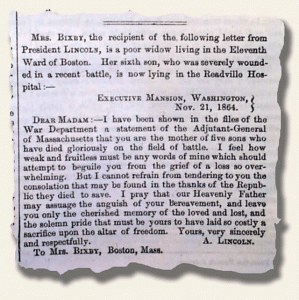They put it in print…
January 12, 2015 by TimHughes · Leave a Comment
 Tabloid journalism was alive and well in 18th century America. If you thought “sleazy” reports were a concoction of the 20th century, you would be wrong, as newspaper editors had, for hundreds of years, few concerns about slandering those they found offensive or who were on the other side of the political fence.
Tabloid journalism was alive and well in 18th century America. If you thought “sleazy” reports were a concoction of the 20th century, you would be wrong, as newspaper editors had, for hundreds of years, few concerns about slandering those they found offensive or who were on the other side of the political fence.
The “Pennsylvania Ledger And Weekly Advertiser” of December 24, 1777” was a Tory newspaper (loyal to the King, not the American cause of independence) and on page 2 the editor printed portions of a letter from George Washington to his wife, intercepted on its route. Obviously no friend of Washington’s, he even publishes the letter as a separate piece and offers for sale in his shop: ” “The printer has received from New York a few copies of an intercepted letter from General Washington to his Lady, dated June 24, 1776, which he is now selling at his shop in Market Street. The following is an extract.”
Value of the internet…
May 13, 2010 by TimHughes · Leave a Comment
 I never fail to be amazed at the incredible wealth of information which is available on the internet, and I never fail to be thankful for such an incredible resource, particularly remembering what it took thirty years ago to research a newspaper.
I never fail to be amazed at the incredible wealth of information which is available on the internet, and I never fail to be thankful for such an incredible resource, particularly remembering what it took thirty years ago to research a newspaper.
Back in the 1970’s and ’80’s, when I wrote up an issue for the catalog I had to pull out the encyclopedia if I was unsure of a specific date or consequences of a certain battle. And I also kept close at hand other resources which would document events I was finding in our inventory of newspapers.
But today, more information than I could possibly need flashes on my screen in a matter of seconds. What was the date James Buchanan died? Wikipedia tells me more quickly then it takes me to type “james buchanan”. Many times I’ll read an interesting article about a person which sounds intriguing but is lost to my memory. The web quickly provides a wealth of detail.
What brings this to mind is an entry I worked on this morning. The “Army & Navy Journal” of Dec. 3, 1864 has a touching item about a Mrs. Bixby who received a letter of condolence from Abraham Lincoln for her loss of five sons in the Civil War, the sixth was lying wounded in a hospital. The article includes the letter by Lincoln. Not having heard of this letter, as a whim I decided to Google “mrs. Bixby letter” to see if this was an “event”. To my surprise there is more to the story than the article could give, thanks to the “Collected Works of Abraham Lincoln”.
The touching letter by President Lincoln can be read in the photo. Below is the “rest of the story”:
Credit: “Collected Works of Abraham Lincoln”: In the fall of 1864, Massachusetts Governor John A. Andrew wrote to President Lincoln asking him to express condolences to Mrs. Lydia Bixby, a widow who was believed to have lost five sons during the Civil War. Lincoln’s letter to her was printed by the Boston Evening Transcript. Later it was revealed that only two of Mrs. Bixby’s five sons died in battle (Charles and Oliver). One deserted the army, one was honorably discharged, and another deserted or died a prisoner of war.
The authorship of the letter has been debated by scholars, some of whom believe it was written instead by John Hay, one of Lincoln’s White House secretaries. The original letter was destroyed by Mrs. Bixby, who was a Confederate sympathizer and disliked President Lincoln. Copies of an early forgery have been circulating for many years, causing some people to believe they have the original letter.
The point of this piece is to cite just one example how the internet opens a whole new world to the tidbits of history we find within early newspapers. A 150 year old article might pique the curiosity, but it is the internet which can satisfy. It’s a fascinating combination of very old & very new technology which fit so well in this hobby we love. Give the internet a try with some articles in your collection. You may be pleasantly surprised at what you will find.


